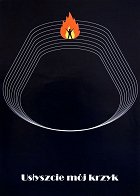Regie:
Maciej J. DrygasDrehbuch:
Maciej J. DrygasKamera:
Stanisław ŚliskowskiInhalte(1)
On 8 September 1968, official Harvest Festival celebrations were held at the 10th Anniversary Stadium in Warsaw, attended by Władysław Gomułka, First Secretary of the Central Committee of the Polish United Workers’ Party (PZPR, the communist party), and Prime Minister Józef Cyrankiewicz. Something happened during the event that was not mentioned by the papers, neither in Poland nor abroad, as if no one had noticed anything. Ryszard Siwiec, a clerk from Przemyśl, set himself on fire in front of the crowd of many thousands. He managed to scatter a few leaflets explaining that his self-immolation was in protest against the Warsaw Pact forces entering Czechoslovakia. Severely burned, Siwiec was taken to hospital, where he died. Many years later, on the basis of documents, statements from relatives as well as eye-witnesses, Maciej Drygas, the film’s director, seeks to find out who Ryszard Siwiec was and what cause brought him to inflict such terrible suffering on himself. The film includes fragments of an authentic recording made by Ryszard Siwiec two days before his self-immolation. “I, Ryszard Siwiec, of sound body and mind, after a long struggle and much consideration, have decided to protest against the total tyranny of evil, hatred and lies taking over the world”. These were the words with which he began his testament. Maciej Drygas’ masterpiece is still poignant today. (Warsaw Film Festival)
(mehr)Kritiken (1)
Zusätzlich zu diesem Dokumentarfilm widmete Maciej J. Drygas die Radiosendung "Testament" dem Andenken an Ryszard Siwiec. Beide gehören auch heute noch zu den wichtigsten Meilensteinen des Gedenkens an den Siwiec-Protest. In den 1960er Jahren erwies sich die Selbstverbrennung des buddhistischen Mönchs Thich Quang Duc als äußerst einflussreich und beeinflusste eine ganze Generation von Menschen, die sich für ein höheres moralisches Prinzip opferten. Mehr zu den polnischen Realitäten und der Hypothese, ob sich Siwiec im September 1968 aus Liebe zur Tschechoslowakei geopfert hat, bieten einige Texte aus der Feder von Petr Blažek. Glücklicherweise kann diese verkürzte Interpretation durch die vollständige Geschichte der wachsenden Frustration ergänzt werden, die in Polen nach der Niederschlagung der Studentenunruhen im März 1968 (nach der vorzeitigen Streichung des "antisowjetischen" Stücks "Dziady" aus dem Programm des Warschauer Nationaltheaters) entstand.
()
Galerie (5)
Photo © Warszawski Festiwal Filmowy

